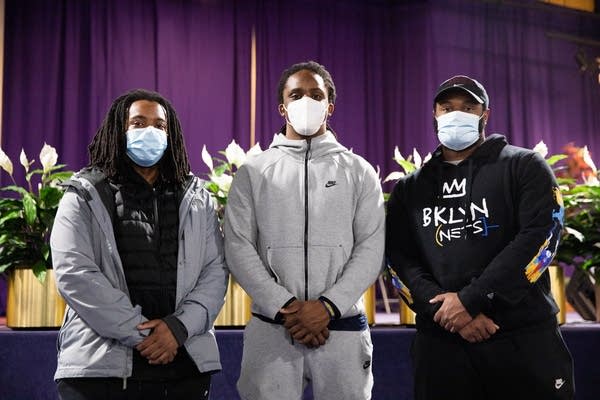Minneapolis church holds 'safe space' to deal with trauma after death of George Floyd
Shiloh Temple started offering counseling and other services for community members at the start of Derek Chauvin's trial

Go Deeper.
Create an account or log in to save stories.
Like this?
Thanks for liking this story! We have added it to a list of your favorite stories.
A church on Minneapolis’ north side is responding to multiple crises at once.
Inside the chapel of Shiloh Temple International Ministries, medical professionals at small vaccination stations administer coronavirus vaccines. Another area holds a food bank.
Most recently, coinciding with the start of the trial of Derek Chauvin on March 8, the temple has become a safe space.
Jalilia A-Brown, a pastor who leads community engagement at Shiloh Temple, said it is a place where anyone, especially Black Minneapolis residents, can come to be supported — and never judged.
Turn Up Your Support
MPR News helps you turn down the noise and build shared understanding. Turn up your support for this public resource and keep trusted journalism accessible to all.
“Where you could know you are somebody and your points are valid and you are seen and heard,” A-Brown said.
The pastor said this moment demands support for Black communities, for whom this year carried specific pain. People from across the Twin Cities metro area have visited and some have been referred by the city of Minneapolis, A-Brown said.

Chauvin’s trial is expected to last for several weeks amid heightened security at the Hennepin County Courthouse and throughout the Twin Cities. The former Minneapolis police officer is charged with murder and manslaughter in the May 25, 2020, killing of George Floyd.
“This death not only shook Minneapolis but it shook the world,” A-Brown said. “I really believe that Minneapolis will be the place, and his [Floyd] family will be the place that justice is served but also that civil rights is rewritten for the entire Black community.”
Shiloh Temple offers counseling, both one-to-one and in groups. It also offers new connections.
For Concordia University student Devin Flakes, the experience of the safe space has deepened his faith.
“Before coming here, I was really just trying to focus on building my relationship with God,” Flakes said, “but, like, coming here and meeting new people has been really helping me build that relationship.”
Flakes and his friends, Corey Hines and James Woods, spent the first week of the Chauvin trial volunteering at the Shiloh Temple safe space and food shelf. Hines, 19, said that between the aftermath of Floyd’s death and the pandemic, young people already have seen a lot of heartache.
“We have been living through a lot of historical events and after a while it does get tiring,” the sociology student at the University of Minnesota said.

Woods, a 21-year-old who attends Augsburg College, grew up in north Minneapolis. He worries about what the outcome of the trial will mean for his community.
“We don’t know what this trial holds for us and holds for the officers, and if there is going to be riots or something after this,” Woods said. “This is an important community to me. I care what happens to it and I care about the people in it so I am really worried about how people are going to take this and what’s going to happen.”
Hines said he’s encouraged by more open and vulnerable conversations around racism and trauma, but he, too, feels the outcome of this trial has the potential to personally impact every Black resident in Minneapolis and beyond.
“This trial is definitely a statement as to how the government will react to the citizens as we, the people, have been protesting and even the riots, it will show if these are effective means or if it still feels like it is not enough to get their attention about how serious this is to us,” Hines said.
A-Brown says the safe space will continue through December with hopes for finding more mental health professional volunteers. Three more officers charged in the killing of George Floyd — J. Alexander Kueng, Thomas Lane and Tou Thao — are scheduled to stand trial in August.


